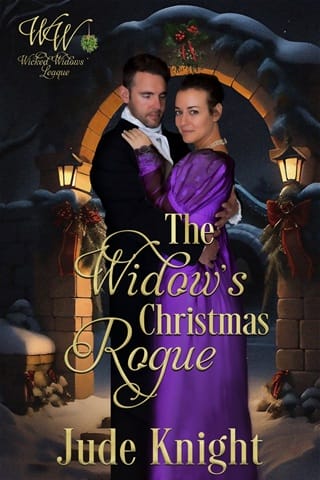Chapter 11
CHAPTER ELEVEN
F or Jessica’s sake, Martin needed to stay calm. Her grief made it nearly impossible. Martin had to hold her gently in his arms and murmur soothingly when what he wanted to do was hit something. Hard. Colyton, preferably. The man was lucky he was dead.
Now he knew why the Duke of Haverford had taken his sister away from her horrible marriage, and why Colyton had not protested. Jessica said Haverford had arrived a few days after the birth, expecting to meet his new niece, and instead finding Jessica grieving and Colyton ranting. Reading between the lines, Martin guessed that the brute had beaten his wife for repeatedly asking for her daughter.
Haverford had taken Jessica from the house and gone looking for the midwife. “She left my baby at the church door,” Jessica told him. “She didn’t know the vicar was away from home.” She turned her face into his shoulder and wept again. The baby must have died. Poor little mite. Poor Jessica .
“I’m sorry,” she said, eventually. “Holding me while I cried all over you is outside of our agreement.”
“We are friends, are we not?” Martin said. “Friends rejoice with one another and grieve with one another. I am so sorry for what you have gone through, Jessica. I wish I could make it better.”
She cupped his jaw with one hand. “I have never known anyone like you, Marton. I’m glad you are my friend.” She wriggled until she was on her knees beside him, facing him, and rested her other hand on his shoulder before leaning in for a kiss. He tried to keep it gentle and friendly, but she had other ideas. “Swive me, Martin. Make me feel good,” she demanded.
Perhaps for her it was a remedy for grief and nothing more, but for Martin, this time was different, deeper. He had already been feeling more for her than made sense for a passing affair—protective, tender, jealous, proud she had chosen him for her first lover. Now he had to admit, if only to himself, that he was in serious danger of falling in love.
He lay with her in his arms after they’d finished, reluctant to release her. After a while, both for something to say and because he really wanted to know, he asked about her childhood. It sounded like an idyllic nursery in which to grow up, with doting servants, kindly older half-brothers, and the loving presence of the woman Society now knew as the Duchess of Winshire.
“She had a terrible marriage, too,” Jessica mused. “But of course, she was better born than I, and she gave His Grace of Haverford two sons. She is a strong woman, and I admire her nearly as much as I love her. Her second marriage is a love match.”
The whole of Society knew that, too—how they had wanted to marry as young people, but had been denied. Then after years of separation and a marriage each, the dowager Duchess of Haverford and the widowed Duke of Winshire had fallen back in love with one another.
The cloud to Jessica’s childhood had been Society’s view of her as Haverford’s base-born and unacknowledged daughter. “As I grew, I heard so many spiteful comments about following in my mother’s footsteps. Yes, and learned never to be in a situation where a so-called gentleman felt emboldened to offer—or even attempt—my ruin. Well. That is in my past, now.”
Not really. The situation with Colyton had been laid unfairly at her feet precisely because of her irregular birth. No other duke’s sister, if supported by the duke himself, would have been the subject of malicious gossip over the failure of her marriage.
“But enough about me, Martin. Tell me more about you. Did your mother really leave you to be raised by your uncle?” She shook her head. “I cannot understand a mother leaving her child. If only I could have taken Colyton’s daughters with me when I left. Had my baby lived, nothing my brother said would have convinced me to go with him.”
She looked horrified, as if she had just heard her own words. “I am sorry. I do not mean to criticise your mother. I do not know her circumstances.”
“No need for an apology.” Martin told her how he felt about being left with his mother’s brother, his guardian, while his mother took Chloe with her into her second marriage. “For a time, I thought the same as you, but I think I understand her better now. My uncle was a hard man. Fair, but hard—and much older than my mother. He had very strict ideas about how women should behave, though Chloe never let him douse her spark. I think Mother was quenched by him, and both marriages were an escape for her.”
He sighed. It had been a hard-won understanding. “Once I was older, I realised that my uncle must have forced the choice on her, but as a child, I thought she had chosen Chloe over me, though she visited often, and wrote even more frequently. Sometimes every day! Poor Mother. She died when I was eight, after giving the Earl of Seahaven two more daughters. The fact that one was born six months after the wedding explains another reason for the choice that Mother made. Uncle Swithin would never have accepted a love-begotten child into his home. After she died, Uncle Swithin brought Chloe home.” Despite his mother’s death, that had been the happiest time of his childhood, after Chloe came home and before his uncle began to take him about to learn the business of the estate.
He and Jessica whiled away the rest of the afternoon sharing stories from their past, then ate their dinner and went up to bed together. Tonight would be the last night, and Martin was determined to make it memorable.
 Fullepub
Fullepub 



